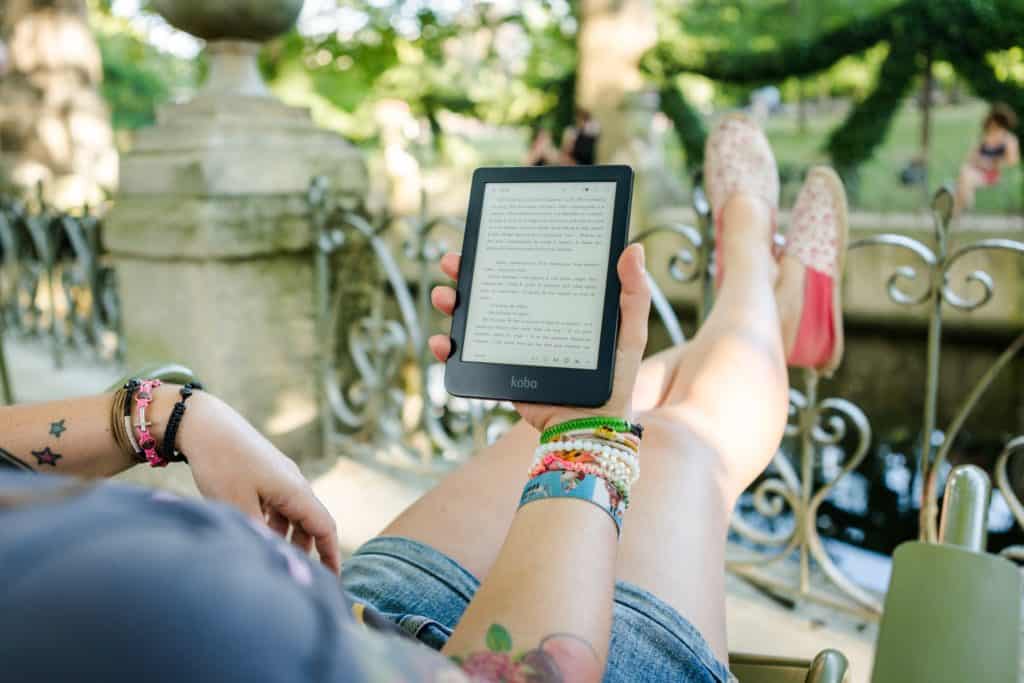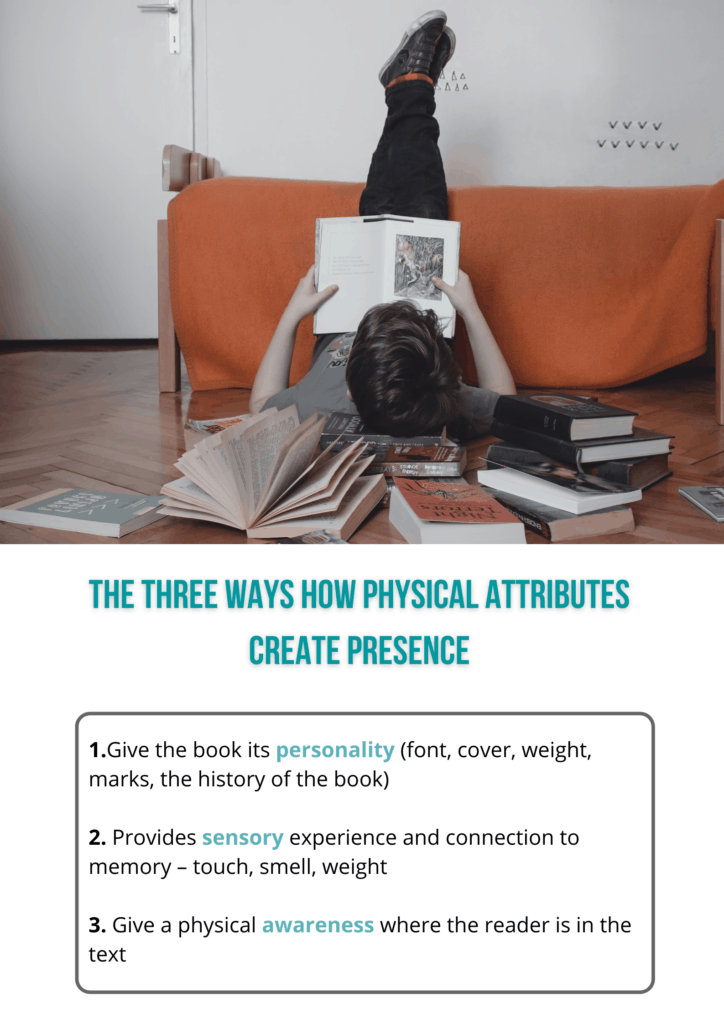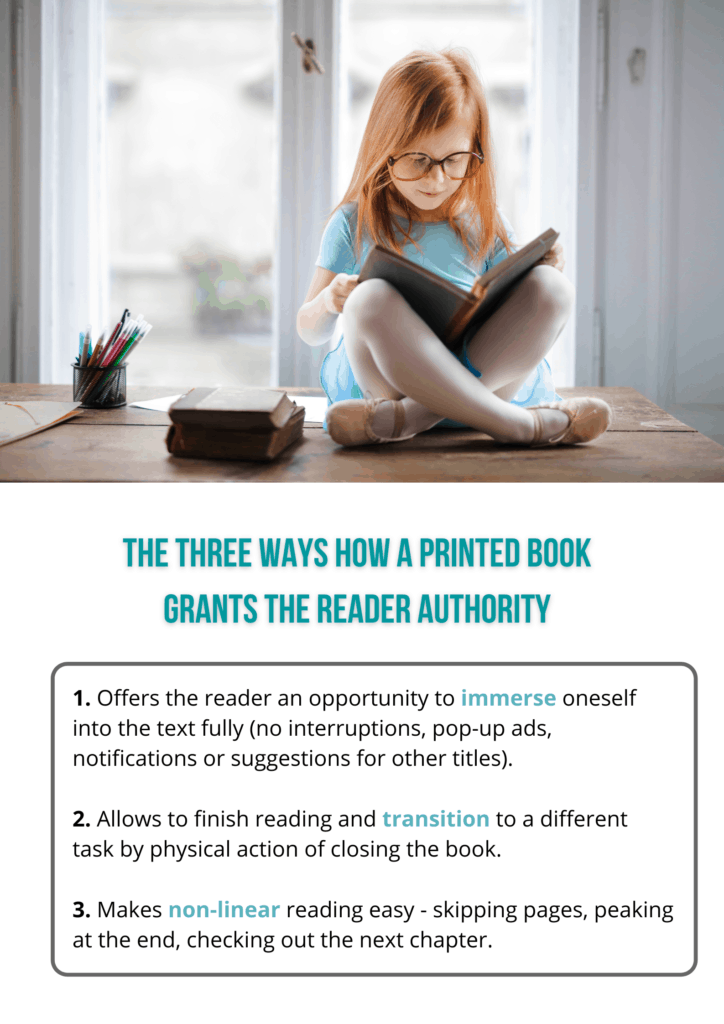Are you a reader? Have you ever been lost in a book for hours not realising that it has already got dark? Have you ever had a temptation to skip a few pages or to peak in the end of the book? Have you had an experience of words lifting of a page and hitting you, causing to put the book down to process what you’ve read?
All of the experiences relate to the physicality of reading and the special connection between the mind and the medium. Let us explore how reading a text on screen is different from immersing oneself into the pages of a physical book.

First of all, electronic books are convenient, space-saving and cheaper than the paper equivalent. But people still prefer a physical book to an electronic copy. What is so special about books? Let’s imagine that we are reading the same novel both on screen and on paper. How the experience would be different?
Reading a paper book is like meeting a friend. Each book has a personality. The texture of the pages, the unique smell, the chewed corners or water marks – each tell a story. The sensory experience of reading is deeply connected to memory and to a certain point in reader’s life. When I was nine, I spilled a glass of water over an old copy of “Twenty Thousand Leagues under the Sea”. Ironic! I remember feeling guilty and clumsy, but also smug that I managed to blot the pages quickly and minimise the damage. When re-reading the book in later years I was reliving my adventures with Nautilus and captain Nemo, but I could also see the warped pages which connected me to the younger self. Sadly this book is now lost, but not the memory.

A book has a story and a life beyond the text it carries. It also has a weight and it has dimensions. As much as the meaning of the text is created in the imagination of the reader, the physical attributes, like weight and size, place the text within the personality of the particular book. This provides a presence and a special connection between the reader, the book and the author of the text.
Unlike an electronic text, which can be deleted, copied and downloaded an infinite amount of times, a book has a lifespan and it can only be present in one place at a time. It will be missing if it gets destroyed, lost or passed on. The text cannot be formatted without damaging the book, and all personal notes and markings have to be done by hand, which adds a personal touch (Confession – I am a serial book-scribbler. Sometimes it gets ridiculous. If I ever refuse to lend you my book, it is because I wrote something personal in the margins).
An electronic text is only “called to life” (created) when we download it or when we open the Kindle; the text also disappears when we close the tab or shut the device down. However, a paper book exists independently; whether we read it or not – the book will quietly stand in a shelf and wait for us. Moreover, it can both predate and succeed us. It is possible to inherit a book, but not an electronic text. It doesn’t make sense, because an electronic text is ephemeral, it doesn’t exist until we need it. I’d like to visualise it as a person versus a product. These are two very different types of relationships.

when we read a book, it is more like a relationship with a person
The way a text is arranged in a book gives its reader a full authority over it. The reader is granted permission to flip through pages, skip a few chapters, go over and over the paragraph or put the book aside if needed… When we read an electronic text, we scroll with our thumb. The focus is so narrow that even our thumb is almost hidden from our field of vision and gets disconnected, all we see is a moving page in front of us.
If we read for long enough time, this motion hypnotises us and we enter a flow (think about the mindless scrolling through social media timeline or a spinning roulette in a casino). We are captivated and amused by the text in front of us, but are we processing the thoughts deep enough? It is often more pleasurable to keep scrolling, rather than to stop and think about what we’ve just read. This explains why people who read for escapist reasons are generally more acceptive of electronic books.
Getting lost in a book is an interesting phenomenon, because whilst we can be consumed by the ideas presented in the book, physically we never get lost. In a printed book we know exactly where we are. The progress can be painfully slow or disappointingly fast, but it is always visible. An electronic text will give us a number of pages, or percentage of the text completed, but this information is too precise to orientate us. It will never give this kinaesthetic experience of the weight of pages on the left and on the right.
Modern humans are kinaesthetically hungry. Our fingertips touch the flat cold surface of the screen so often that we stop feeling them as our own. The more we interact with the virtual world, the more we leak authority over our physical environment and even over our own bodies. The mind becomes disconnected and our attention gets trapped in the digital flow. The technophiles and advocates of digital technology see this human-machine conversion as liberation and opportunity; I see it as a tragic loss and flattening out, even reduction of human consciousness. Are we also becoming a product?


